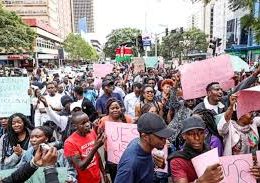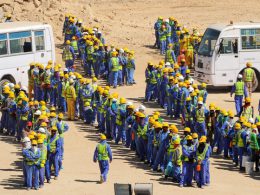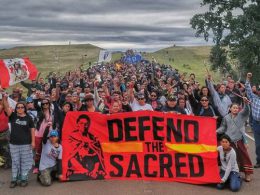Evo Morales and the Movement towards Socialism (MAS) party delivered a devastating defeat to their right-wing opponents in Bolivia´s presidential and congressional elections on 6 December.
Morales captured 63.46% of the popular vote, a massive 36 points more than his nearest competitor and an increase of almost 10 points compared to the 2005 presidential elections. In the traditionally pro-MAS western states, Morales destroyed the opposition, winning 80% in La Paz, 79% in Oruro, and 78% in Potosí. In Cochabamba and Sucre, he won 66% and 56% respectively and in the opposition stronghold states in the east, he increased his support, winning Tarija with 51% whilst coming a respectable second place in Pando with 45%, Santa Cruz with 41%, and Beni with 38%.
Equally importantly, the MAS won 85 out of 130 seats in the House of Deputies and 25 of 36 seats in the Senate. With majority control over the House of Deputies and more than 2/3 control of the Senate, the MAS government can pass any law or make any constitutional change it wants. The massive majority won by Morales and the MAS means that they now have no excuse for not taking the necessary steps to defeat landlordism and capitalism. The right-wing counter-revolutionary forces have been electorally crushed. They must not be given the time and opportunity to rebuild their forces and strike back.
No matter how you look at it, this is a huge electoral victory for Morales and the MAS government. But what´s even bigger is the enormous desire for fundamental change amongst the Bolivian masses and the giant opportunity that exists to break with capitalism and bring about revolutionary socialist change.
Morales recognised this popular mandate for fundamental change, in part, during his victory speech the night of the election, declaring, “We have a responsability to accelerate this process. That we obtained more than two thirds of Deputies and Senators obligates me to accelerate this process of change”. However, he was also careful to strike a conciliatory note saying, “We are a government of dialogue and agreements”, in reference to his willingness to incorporate the defeated opposition into the process of change. This is a warning to the masses not to wait for Morales to act from above. The powerful organisations of workers, indigenous peasants, and the poor that make up the social movements must be the driving force for socialist change in Bolivia and take the necessary steps to take the revolution forward and defeat landlordism and capitalism.
They should mobilise around a socialist program to take over the land of the large landowners and the businesses and industry of the multinational corporations and wealthy Bolivian elite. Workers, indigenous peasants, and the poor majority should assume democratic control over the economy to use Bolivia´s vast natural resources to organise the production and distribution of the wealth according to a democratic socialist plan aimed at satisfying the needs of the entire population.
Democratically organised Defense Committees should be set up to link workers, indigenous peasants and poor communities on a local, departmental, and national level to carry out occupations democratically from the bottom up and to defend against attacks from the right-wing opposition. All elected representatives of the Defense Committees must be subject to immediate recall and, if they earn a wage, it must not exceed the average wage of the workers, indigenous peasants or community members they represent.
The social movements also cannot afford to ignore the counter-revolutionary potental that exists from the military. Right-wing officers must be immediately removed from their positions, and Soldiers´ Committees should be set up, so that the rank and file can democratically elect officers. The Soldiers´ Committees must be linked up with the Defense Committees to ensure community control over the military.
After overthrowing capitalism, the Defense Committees should then form the basis for a democratic socialist state of workers and indigenous peasants and organise the democratic planning of the socialist economy in Bolivia.
The absolute failure of neo-liberal capitalism in Bolivia
Neoliberal capitalism had its way in Bolivia for more than 25 years. It has failed miserably, and the masses bear the scars to prove it. Although it possesses some of the most bountiful mines, richest land, and largest gas reserves in the entire world, Bolivia is home to the poorest people in all of South America.
The statistics speak for themselves. In Bolivia, approximately 58-70% of the population live in poverty, on $2 or less per day, while roughly 30-36.5% live in extreme poverty or utter indigence on $1 or less per day. In terms of daily life, this means that pretty much every basic necessity is out of reach for a huge section of the population: 70.8% have inadequate housing, 58% lack sufficient water services, 43.7% suffer a paucity of electricity services, 52.5% are deprived of adequate education, and 37.9% endure poor or non-existent health care services.
The inequality is also extreme in Bolivia. The wealthiest 10% of the population receive 35.4% of the national income while the poorest 40% take in only 15.1%. According to Economic Development Minister, Xavier Nogales, a wealthy person in Bolivia earns 90 times as much as a poor person.
The indigenous peasant population suffers the most from the failure of capitalism in Bolivia. According to the International Fund of Agricultural Development (FIDA), Bolivia literally has the poorest peasant population in the entire world, with 97% living in poverty and 69% living in extreme poverty. This is the direct result of the semi-feudal land relations creating some of the most unequal land distribution in the entire world. Large landowners, making up roughly 7% of the population, own 87% of the land (28 million hectares) while the entire peasant population is forced to make do with the remaining 13% (4 million hectares).
The working class is also plagued by poverty, instability, and outright suffering. Only 20% of the Bolivian workforce is unionized, while 57-63% work in the informal sector, without labor rights, a guaranteed contract or any sort of job stability. The average monthly wage is roughly $89 per month, and only $59 for women.
Advances and limitations of the MAS reforms during the last four years
Any attempt to bring about fundamental change in Bolivia within the capitalist system is doomed to fail. The MAS government can pass reforms that slightly mitigate the suffering of the masses temporarily, but they can´t solve the fundamental problems of poverty and inequality. In the meantime, the right-wing opposition will utilise its economic, political and social power to relentlessly attack the MAS government and social movements, preparing the ground for a future return. Any comeback from the right-wing inevitably means brutal repression of the social movements combined with the rolling back of the changes of recent years. They can only be prevented from re-grouping their forces to prepare to strike back if landlordism and capitalism are over-thrown.
Undeniably, Morales and the MAS government have made important advances in the last four years. The partial nationalisation of the hydrocarbon gas industry in May 2006 put a controlling share of the industry under state control and increased the tax rate on multinational oil companies to 82%, raising the state gas income from $300 million in 2005 to $1.6 billion in 2007. In 2003, the hydrocarbon industry represented 4.5% of GDP and by 2006, that figure had jumped to 14.7%.
The MAS government has used the funds to massively increase state spending on social programmes. It created a yearly stipend, called Juancito Pinto, that in 2008 provided economic assistance to 1.8 million school children. La Renta Dignidad expanded social security payments to elderly people over the age of 60 and Juana Azurduy reduced infant mortality by paying a stipend to pregnant or lactating women who visit a doctor and follow a program for pre-natal care. The literacy program, Yo Si Puedo, has taught more than 1.5 million people how to read, prompting the United Nations Educational, Scientific, and Cultural Organization (UNESCO) to officialy declare Bolivia a country “free of iliteracy” in 2008. In addition, the government has initiated programs to provide youths with their first jobs and to bring running water to those who currently go without.
These are all welcome advances which have improved the lives of the majority and which socialists should support. However, they fall far short of ending the generalised poverty that continues to plague the Bolivian people. According to the government´s own statistics, the poverty rate has dropped during the last four years, but only by 3%, from 60% to 57%. Extreme poverty has also fallen, but only minimally to 31% from 38%.
As the experience of Venezuela today shows, if reforms are not linked to defeating landlordism and capitalism and the introduction of a democratic socialist plan of production, the reform programmes can be rolled back and destroyed.
Moreover, although the profits and influence of the multinational corporations have been reduced, they continue to plunder Bolivia´s natural resouces, taking out enormous profits and leaving only a small amount of taxes and a great deal of suffering in return. Nowhere is this clearer than in the mines. From 2006 to 2009, multinational mining corporations took out $4.4 billion in documented profits from Bolivia (the government suspects that with illegal exports the real figure is actually closer to $8 billion). During the same period, these corporations paid a measly $220 million in taxes to the Bolivian state, roughly 5% of their documented profits.
Morales and the MAS government have brought about positive changes, but they have stopped far short of making the revolutionary change necessary to overcome the massive systemic problems facing the majority of the Bolivian population.
Relentless right-wing opposition in spite of Morales´ democratic support
While Morales and the MAS government have carried out a moderate reform program, the right-wing opposition has viciously opposed them at every turn. It has used its control over the means of communication to try and bring the MAS government down through lies and distortions. It used its majority in the Senate to block progressive laws and its economic control over industry to organise lockouts, road blockades, and to raise the prices on basic necessities. Finally, it also organised a separatist movement, under the guise of a struggle for autonomy, buffered up by semi-armed violent “collision” groups.
The more the MAS government has proven it has the support of the overwhelming majority, the more aggressive the right-wing opposition has become. This reached its peak in August and September 2008, just weeks after Morales won 67% support in a recall referendum. The opposition organized a violent secession movement, seizing the state institutions and gas reserves in the oil and resource rich eastern states, massacring approximately 20 unarmed indigenous peasants in the state of Pando in the process.
The constant and determined right-wing opposition has come in spite of the fact that Morales and the MAS government have assumed a non-confrontational approach which they still hope will allow them to carry out a “peaceful and democratic cultural revolution”. In fact, the MAS government has created an atmosphere of economic and political stability undreamed of while the neoliberal governments were in control. Even the IMF has commended the Morales government for having achieved the highest growth rate in Latin America in 2008, a feat that it is expected to be repeated in 2009 with a growth rate of 2.8%.
In reality, the capitalist class knows that the MAS government, in and of itself, does not represent a serious threat to its system. Its resistance stems from a mortal fear that in bringing about positive changes based on nationalisations using socialist rhetoric, Morales and the MAS government could inspire the masses, lose control of the situation, and the moderate reform programme could develop into a fully fledged revolutionary socialist movement. As such, the MAS government represents a serious threat to the capitalist class, which will do everything in its power to opppose it, no matter how much democratic support Morales and the MAS enjoy.
Lessons of Chile 1973 and Hugo Chávez´s Venezuela
The tragic experience of Salvador Allende´s Popular Unity government (1970-1973) in Chile provides important lessons for the Bolivian masses today. Allende, too, enjoyed democratic support and carried out a program of nationalisations and land reform, albeit on a much larger scale. Like Morales, Allende spoke of a “peaceful, democratic revolution” and, in spite of relentless attacks, believed the capitalist opposition would ultimately have to respect his democratic mandate. He held onto these illusions right up until the end, even while sections of the military were alerting him to plans of a coup and 500,000 workers and peasants were marching to the presidential palace asking for arms to defend their revolution and the Allende government. On 11 September, military general, Agosto Pinochet, led a military coup, first bombing the presidential palace, killing Allende, and then unleashing a murderous reaction against the social movements and poor. The “peaceful and democratic revolution” ended, like too many others in Latin America, with the assassination and disappearance of thousands and the torture of an estimated one out of every ten Chileans. As Leon Trotsky would say, the Pinochet dictatorship, like all reactionary dictatorships, was the price paid by the working class´ for not taking power when it had the chance, due to the wrong policies of its leadership.
The Bolivian masses should also draw lessons from the complex process unfolding in Venezuela right now. After carrying out a series of changes favorable to the masses and defeating a number of attacks from the capitalist opposition (including a coup attempt in 2002), Hugo Chávez´s government, more than 10 years in office now, is facing a series of obstacles and contradictions stemming from its unwillingness to break from capitalism. The economic crisis and the drop in international oil prices have cut the legs out from under Chávez´s pro-poor programs, while inflation and crime have spiraled out of control. Chávez’s top-down governing style has laid the basis for the development of a bureaucracy which is increasingly becoming a drag on his “Bolivarian Revolution” and a new “Boli-bourgeois” which has gotten extremely rich due to its ties to the government and the flow of oil money into Venezuela, highlights the fact that capitalism, and the poverty and inequality that goes along with it, is alive and well in Venezuela. Add to this a range of political missteps by Chávez, such as his failed attempt to amend the constitution to allow for his indefinite reelection, and you have all the ingredients necessary for widespread frustration and disilusionment amongst the masses and the re-emergence of the right-wing opposition, which just a few years ago seemed impossible to many (For an in depth analysis on Venezuela, see Venezuela: A New Phase and Greater Dangers
Without independent action from the social movements in Bolivia, to break with capitalism and bring about socialism, Evo Morales and the MAS government will suffer a fate similar to that of Chile in 1973 or Venezuela today.
The MAS proposal: a plural economy
While the desperate need and mass support for fundamental socialist change is abundantly clear, Morales and the MAS government has failed to take such bold action. Following a political ideology called Socialism in the 21st Century – also promoted by other left leaning governments in Latin America, such as Hugo Chávez in Venezuela and Rafael Correa in Ecuador – they hope to build what they call “a Plurinational state and a plural economy”.
The ‘Plurinational state and plural economy’ aims to create a state that for the first time grants full rights and self-determination to all indigenous communities. Economically, it aspires to combine a socialist economy (based on the nationalisation of strategic industries) with a capitalist economy (based on private property) and an indigenous economy (based on communal ownership of indigenous lands). The MAS Program for 2010-2015 states, “with the Plural Economy model, the state is constitutionally mandated to actively intervene in the market and direct the economy…to realise an equal distribution of the wealth…” But it goes on to explain, “the State promotes, gives incentive and legal security to private and economic activities that contribute to the growth of the country.”
The program then gives a detailed explanation of an ambitious plan to use the resources from the nationalisation of the hydrocarbon industry to make a “great industrial leap”, first in the hydrocarbon industry and later in lithium, cement, mining, agriculture, and petrochemical sectors, amongst others. With the resources generated from the industrialisation, Morales and the MAS government have an equally detailed and ambitious plan to expand the pro-poor social programs while improving pretty much every aspect of Bolivian society: education, health care, housing, employment, water, electricity, and gas services, etc. Using almost the exact same words as Salvador Allende, what Morales and the MAS government hope to do is create a “democratic and peaceful cultural revolution”.
The peaceful co-existence of capitalism and socialism is impossible
While the promise of a democratic and peaceful revolution is appealing on the surface, a programme based on the peaceful existence of capitalism and socialism cannot succeed. Relentless attacks – political, economic and violent – will eventually lead to the collapse of the social movements if they don´t move on to revolutionary action. Additionally, it is not possible for moderate reforms or partial control of the economy to generate enough wealth to lift the majority of the population out of poverty, especially in neo-colonial countries like Bolivia where semi-feudal land conditions and extreme poverty and inequality are generalised. This is especially true in the context of the economic crisis, which has caused the prices of gas and raw materials, making up 75-80% of Bolivia´s state income, to plummet.
A genuine solution to the problems in Bolivia and a realistic strategy for defeating the right-wing opposition can only be found in the mobilisation of the social movements, the overthrow of capitalism, and the construction of a socialist Bolivia.
For an immediate end to the large landowner system and democratic control over the land!
First, the social movements should mobilise to end the large landowner system once and for all. The indigenous peasant organisations – the most organised and powerful force in the entire country – should occupy the land and place it under the democratic control of the indigenous peasant population.
With a socialist economy based on democratic control over the land, we can end this sick system that puts profits over people. Indigenous peasants can work with the population as a whole to form a plan for how to use the rich land to produce and distribute enough food to meet needs of the entire population.
For democratic worker and communtiy control over the Bolivian economy
The centuries-long thievery of Bolivia´s raw material that started with the Spanish colonisers and continues today with the multinational corporations, must also come to an end. Workers and trade unions should mobilise their forces to occupy the industries that the multinationals and business elite currently own and place them under democratic worker and community control so that the Bolivian people can decide how to use the resources they have to improve their lives.
For the Bolivian people to enjoy the benefits of their country´s wealth, workers in the manufacturing, construction, communication, comercial, banking, transportation, electricity, gas and water sectors must have the power to democratically plan production together with the communties who must have the ability to democratically express their needs. Only on the basis of a socialist economy is it possible to imagine poor communities of workers and indigenous peasants in Bolivia enjoying full access to food, housing, education, healthcare, and all basic services.
For a socialist Bolivia as the first step towards a socialist confederation of Latin American states
Beginning with the Cochabamba Water Wars and continuing through to the Gas Wars and the election of Evo Morales, the Bolivian masses time and time again have placed themselves at the forefront of the global struggle against imperialism, neoliberalism, and the capitalist system as a whole.
With the landslide election of Evo Morales and the MAS government on 6 December, the social movements scored another inspiring victory, shared not only by workers, indigenous peasants, and poor people in Bolivia, but throughout all of Latin America and globally as well.
Worldwide, hundreds of millions are becoming increasingly aware that capitalism is a failed system that must be replaced. But up until now, they have found no concrete alternative. As leaders in the global struggle against capitalism, the Bolivian masses have the opportunity to provide that alternative by overthrowing capitalism and building genuine socialism.
But a socialist Bolivia cannot survive on its own. A conscious appeal must be made to workers, poor peasants, and the opressed masses throughout all of Latin America and the world to follow its example, overthrow capitalism and build socialism in their own countries. The first step should be to establish a democratic socialist federation of Bolivia, Venezuela, Cuba and Ecuador – whose leaders claim to be building socialism. Such a step would allow the economies of these countries to be integrated and democratically planned as an example to the whole of the Latin America.
Only on the basis of a global socialist revolution, which places the enormous natural wealth and productive capacity in this world under the democratic control of workers, peasants and ordinary people can we satisfy the needs of the entire population and resolve the grave problems which currently confront human society. By doing so, for the first time, the vast majority of the population will be freed from the animal struggle just to survive and will be able to live a dignified life in a truly “human” society.












